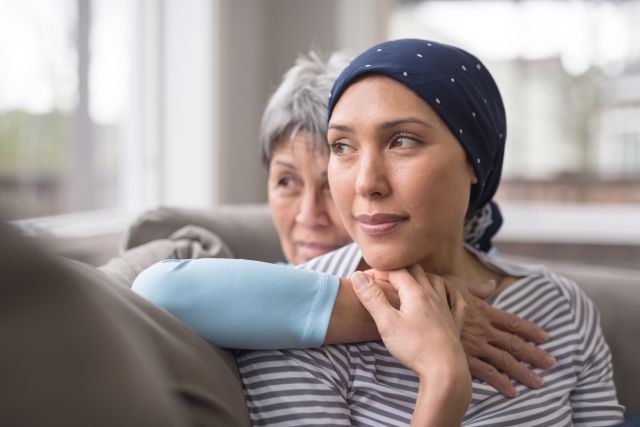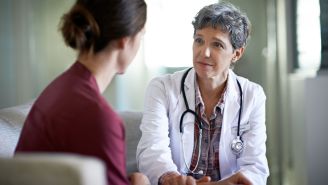Updated on October 21, 2024.
Aside from skin cancer, breast cancer is the most common form of cancer in the United States. Given that a woman in the U.S. has a one in eight chance of developing the disease, being able to identify changes in your breasts and signs of the illness are key to prevention and early diagnosis.
“Just as we're worried and aware about other aspects of health, like weight, exercise, or diet, it’s important to be self-aware of your breast health,” says Sean Edmunds, MD, an OBGYN at St. Mark’s Hospital in Salt Lake City, Utah.
Breast self-awareness
In years past, experts suggested women perform breast self-exams once a month. But recent research has found that these exams don't reliably detect cancer in average-risk women. They can even lead to a greater number of false positive test results. (These are test result that suggest a person has a specific condition when in fact they do not.)
These days, many official guidelines recommend breast self-awareness, which means knowing what your breasts typically feel like. Having this baseline makes it easier to identify changes that could be signs of breast cancer. Guidelines vary on the value of having regular breast exams done, so talk to your healthcare provider (HCP) to make an informed decision together.
Spotting unusual changes
The most common symptom of breast cancer is a new or changing lump, either in the breast or closer to the underarm.
“Notice if you have a lump that's getting bigger, harder, or stuck in place,” says Dr. Edmunds. Lumps can appear either with or without pain and can vary in size. While most lumps found in women between their 20s and early 50s are benign (noncancerous), it's important to rule out the chance of breast cancer if you discover anything unusual.
Abnormal skin changes are also important to note. These include itchiness, irritation, redness or discoloration, scaling, swelling on part of the breast, pain, or dimpling.
“If you're noticing any skin or tissue distortion where the skin is puckering in or there's any distortion in the natural contours of the breast, those are all abnormal things and you should come be checked out," says Edmunds. Be aware of nipple skin changes that occur outside of pregnancy, as well, like discharge, pain, crusting, or color change.
If you do feel or see anything abnormal or are worried about sudden breast changes, schedule an appointment with your HCP. They can evaluate changes and suggest a next step, which is typically imaging in the form of a mammogram and a breast ultrasound.
Who is at greater risk for breast cancer?
While all women should be self-aware, there are certain groups at a higher risk for breast cancer than others.
A personal or family history of breast cancer is one factor.
“If you have a first-degree relative who was under age 50 when they were diagnosed, then we tend to do early screening,” notes Edmunds. HCPs will often recommend early breast cancer screenings starting at age 30 for individuals who have a hereditary risk of the disease, such as BRCA1 and BRCA2 gene mutations.
Fewer than 15 percent of women diagnosed with breast cancer have a family history of the disease, however, so it’s important to note other risk factors.
The odds increase with age, for example. Early menstruation, becoming pregnant at an older age, late menopause, obesity, and a history of radiation treatment on your chest are associated with a higher risk. Some studies suggest that lifestyle habits such as not being physically active, drinking alcohol, and tobacco use can affect your likelihood of getting the disease. That said, many people who develop breast cancer may not have any risk factors, so don’t ignore any changes in breast health.
Women with dense breasts have a greater chance of being diagnosed with breast cancer, as well. Edmunds notes that due to the density of the tissue, women with dense breasts may also not catch any changes as early as others.
“Be conscious of the fact that it can be harder to feel changes within your breast, so you may need to take a little bit more time," he says.
For women of average risk, make an informed decision with your HCP about when to begin breast cancer screenings after age 40. Leading authorities advise that women should begin receiving mammograms in their 40s and continue screenings every one to two years thereafter, depending on guidance from their provider. Women with a high lifetime risk of breast cancer are encouraged to get mammograms and MRIs beginning at age 30 or on an individualized schedule based on family history and guidance from their HCP.
How can you reduce your risk of breast cancer?
Besides being aware of the signs and symptoms of breast cancer, there are many other steps you can take to reduce your risk of developing the disease.
Keep an open dialogue with your HCP about the frequency of breast cancer screenings and when to begin getting mammograms. A healthy lifestyle is also a factor in keeping your risk of breast cancer lower.
“Eat a healthy diet, maintain a healthy weight, exercise, don't smoke, and don't drink alcohol to excess. These are the things that are within our control,” Edmunds says. If you have a baby, choosing to breastfeed may also reduce a person's risk.
Most of all, if you are concerned that anything is abnormal with your breast health, don’t hesitate to schedule an appointment with your HCP for a consultation.
“Be self-aware and don't ignore changes,” says Edmunds. “Come in if you notice something. You may have just seen your doctor, but you don't want to assume ‘Oh, it wasn't felt then, so it's fine now.’ If you notice changes, make an appointment.”







